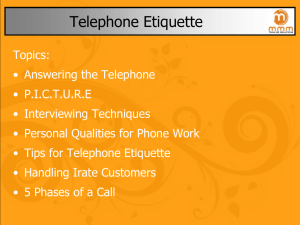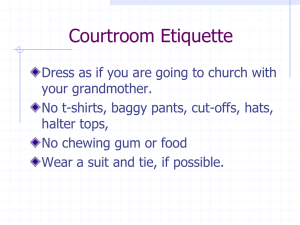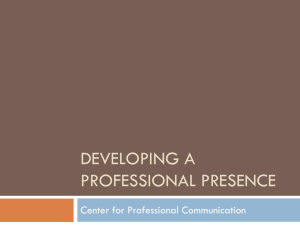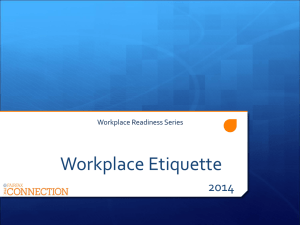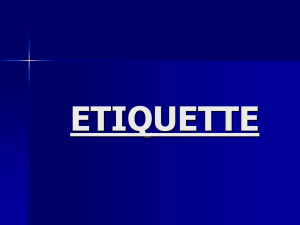2. Business Meeting Etiquette
advertisement
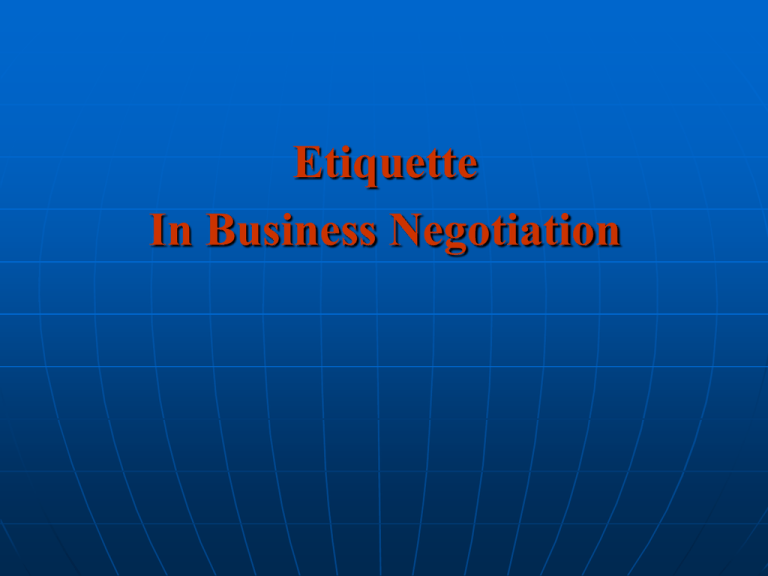
Etiquette In Business Negotiation Etiquette in Business Negotiation The two goals of negotiations: a. Creating strong deals b. Building good relationship Etiquette plays an important role in helping achieve the goals. 1. Etiquette for Greeting and Send-off Greeting etiquette creates an opportunity to start a good relationship with the other party from the very beginning. Send-off etiquette may lay a smooth path for future cooperation. Both are important part of the etiquette in business negotiation. 1. Etiquette for Greeting and Send-off 1. Determine the level and size for greeting and send-off They are determined by three factors: 1) the rank and the purpose of the negotiators; 2) the relationship between the negotiators; 3) the usual practice. (to have someone in the same business with the same or similar rank, title and status in charge of the greeting and send-off.) 1. Etiquette for Greeting and Send-off 2. Know well about the arrival and departure time (accurate information on their arrival time and be at the airport, train station or seaport ahead of time is so important, which means the beginning of the process of trust building) On the day of departure, the following aspects should be paid attention to: a. Be sure to arrive earlier at the hotel where the guests stay. 1. Etiquette for Greeting and Send-off b. Accompany the guests to the airport, train station or Seaport when they are ready; or go directly to the airport, train station or seaport to see them off. c. Before they get aboard, shake hands and say goodbye. d. Wave at the guests when the plane, train or ship begins to move. e. Stay there until the plane, train or ship disappears from your sight. 3. Prepare for the reception (arrangement of accommodation; arrangement of schedule of the next day) 2. Business Meeting Etiquette Three types of meeting in business negotiation: a. Courtesy b. Political c. Transactional 1. Informal meeting (more relaxed and not necessarily take place in the office or meeting room) 2. Business Meeting Etiquette According to Neil Payne, the following aspects should be taken into consideration. a. Business etiquette demands that the person calling the meeting should be the most senior or the one with the most direct or urgent interest in the topic at hand. b. The chair should decide the time, place and agenda. 2. Business Meeting Etiquette c. The chair must make the purpose of the meeting clear to the attendees. d. Punctuality is a must. e. The chair should strive to ensure the meeting stays within a set framework or agenda so that it is kept as short and effective as possible. He must keep disagreements and the like a minimum. 2. Business Meeting Etiquette f. The chair should appoint someone to record the proceedings, documenting major decisions or action points. g. If the outcome of the meeting affects those who were not present, it is considered proper business etiquette to inform them. 2. Formal meeting (management meetings, board meetings and negotiations ----- a set of format) 2. Business Meeting Etiquette According to Payne, there are ten etiquette guidelines for formal meeting: a. Prepare well for the meeting, as your contribution may be integral to the proceedings. b. Dress well and arrive in good time. c. Always remember to switch off your mobile phone. 2. Business Meeting Etiquette d. If there is an established seating pattern, follow it. e. Acknowledge the chair and other participants in the introduction or opening remarks. f. When discussions are under way, it is good business etiquette to allow senior figures to contribute first. g. Never interrupt anyone--- even if you disagree strongly. 2. Business Meeting Etiquette h. When speaking, be brief and ensure what you say is relevant. i. Always address the chair unless it is clear that others are not doing so. j. It is a serious breach of business etiquette to divulge information to others about a meeting. 2. Business Meeting Etiquette What are underlying principles of the business meeting etiquette guidelines? Good manners Courtesy consideration 3.Etiquette at Dinner Party and Dress Code 1. Dinner party etiquette a. Upon invitation (inform the host of your decision) b. Being time conscious (arrive on time or early) c. On arrival (take off your hat and overcoat) d. Seating (take the seat assigned by the host) e. Getting ready to eat (do not begin to eat or drink before the host does) 3.Etiquette at Dinner Party and Dress Code f. Communication (communicate with someone next to you) Toasting (raise your glass when the host and the guest of honor clink their glasses) Taking off your coat (don’t take off your coat no matter how hot it is) At table (pay attention to table manners) 3. Etiquette at Dinner Party and Dress Code 2. Dress Code a. Formal business dress (both men and women should always wear a suit) b. Business casual (certain kinds of casual dresses are acceptable, women have to wear hosiery) c. Casual (some casual dress is acceptable, women must wear hosiery) 4. Etiquette for Signing Agreements Signing the agreement is a useful common practice and a ritual as well. 4. Etiquette for Signing Agreements 1. Preparation of signing ceremony a. Determine the signer (determined by the contracting parties) b. Documentation preparation (a final version of the agreement; stationery needed; national flags arranged) c. The arrangement of signing hall (a large rectangular table; two chairs; document of the agreement; stationary and national flags.) 4. Etiquette for Signing Agreements 2. Procedure of Signing Ceremony a. Participants from both parties enter the signing hall at the same time. b. The signers take their seats and others stand behind their signer. c. The signers sign their own copy first. d. The assistants of both sides pass on the signed copy to the signer of the other party for signature. e. Exchange the signed copy and shake hands. f. Champagne is served to celebrate the signing of the agreement.
